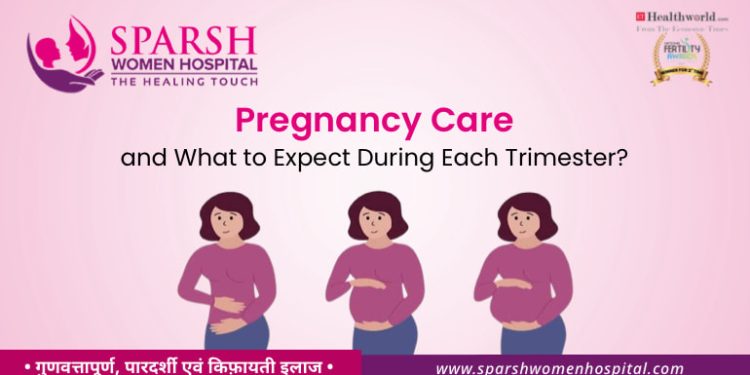Pregnancy is a remarkable journey that brings about profound changes in a woman’s body, emotions, and life. Each trimester of pregnancy comes with its own set of developments, challenges, and milestones. Understanding what to expect during each trimester can help expectant mothers navigate these changes with confidence and ensure they receive the best prenatal care. In this article, we will explore what happens during each trimester of pregnancy and the essential care needed to support a healthy pregnancy.
1. First Trimester (Weeks 1-12)
The first trimester is a time of rapid change as the body begins to adjust to pregnancy. It is during this period that the baby’s major organs and structures start to develop.
Physical Changes
During the first trimester, many women experience symptoms such as morning sickness, fatigue, breast tenderness, and frequent urination. These symptoms are caused by the surge in pregnancy hormones like estrogen and progesterone.
- Morning Sickness: Nausea and vomiting, often worse in the morning but can occur at any time of day.
- Fatigue: Increased tiredness as the body works to support the growing baby.
- Breast Tenderness: Sensitivity and swelling in the breasts due to hormonal changes.
Prenatal Care
Early prenatal care is crucial during the first trimester. This is the time when the first prenatal visit typically occurs, where the healthcare provider will confirm the pregnancy, estimate the due date, and perform initial screenings and tests.
- Ultrasound: An early ultrasound may be done to confirm the pregnancy and check the baby’s heartbeat.
- Blood Tests: These tests check for conditions like anemia, blood type, and immunity to certain infections.
- Prenatal Vitamins: Taking prenatal vitamins with folic acid is essential to prevent neural tube defects in the baby.
Key Takeaway:
- The first trimester is a period of significant development, and early prenatal care, including blood tests, ultrasound, and prenatal vitamins, is vital for a healthy pregnancy.
2. Second Trimester (Weeks 13-26)
The second trimester is often considered the most comfortable period of pregnancy. Many early symptoms like nausea and fatigue begin to subside, and the pregnancy becomes more visible as the belly starts to grow.
Physical Changes
During the second trimester, women may experience several new symptoms as the baby continues to grow and develop.
- Baby Bump: The belly begins to expand as the uterus grows, making the pregnancy more noticeable.
- Increased Energy: Many women feel more energetic compared to the first trimester.
- Fetal Movements: Around the 18th to 22nd week, most women start to feel the baby’s movements, often described as flutters or kicks.
Prenatal Care
Regular prenatal visits continue during the second trimester, with a focus on monitoring the baby’s growth and the mother’s health.
- Anatomy Scan: A detailed ultrasound, usually performed around 18-22 weeks, checks the baby’s organs and anatomy for proper development.
- Glucose Screening: Between 24 and 28 weeks, a glucose screening test is done to check for gestational diabetes.
- Prenatal Classes: Many expectant parents begin prenatal classes during the second trimester to prepare for childbirth and parenting.
Key Takeaway:
- The second trimester is a time of growth and increased energy, with important screenings like the anatomy scan and glucose screening to ensure both mother and baby are healthy.
3. Third Trimester (Weeks 27-40)
The third trimester is the final stretch of pregnancy, where the baby continues to grow and prepare for birth. The mother may experience new physical and emotional changes as the body gets ready for labor and delivery.
Physical Changes
As the baby grows larger, the body undergoes additional changes that can bring about discomfort and anticipation.
- Braxton Hicks Contractions: These are practice contractions that may start in the third trimester, preparing the uterus for labor.
- Shortness of Breath: As the baby grows, there may be increased pressure on the lungs, causing breathlessness.
- Swelling: Swelling of the feet, ankles, and hands is common due to increased fluid retention.
Prenatal Care
Prenatal visits become more frequent during the third trimester, typically occurring every two weeks until 36 weeks, then weekly until delivery.
- Group B Strep Test: This test is done around 35-37 weeks to check for Group B Streptococcus, a type of bacteria that can be passed to the baby during delivery.
- Labor and Delivery Planning: Discussions about the birth plan, pain management options, and what to expect during labor take place during this time.
- Monitoring Baby’s Position: The healthcare provider will monitor the baby’s position to ensure they are head-down and ready for delivery.
Key Takeaway:
- The third trimester is focused on preparing for labor and delivery, with frequent prenatal visits, testing for Group B Strep, and planning for the birth.
4. General Tips for a Healthy Pregnancy
Throughout all three trimesters, maintaining a healthy lifestyle is crucial for both the mother and baby.
- Nutrition: Eating a balanced diet rich in fruits, vegetables, whole grains, and lean proteins is essential for the baby’s development and the mother’s health.
- Exercise: Regular, moderate exercise helps maintain physical fitness, reduces stress, and prepares the body for childbirth.
- Hydration: Staying hydrated is important for overall health and helps prevent common pregnancy discomforts like constipation and swelling.
- Avoid Harmful Substances: Avoiding alcohol, tobacco, and drugs is crucial to prevent harm to the baby.
Key Takeaway:
- Maintaining a healthy lifestyle, including proper nutrition, exercise, and hydration, is vital throughout the entire pregnancy for the health and well-being of both mother and baby.
Pregnancy is a dynamic journey, with each trimester bringing its own set of changes, challenges, and milestones. Understanding what to expect during each trimester and following the appropriate prenatal care guidelines can help ensure a healthy pregnancy and a positive birth experience. By staying informed and working closely with healthcare providers, expectant mothers can navigate each stage of pregnancy with confidence, preparing themselves and their babies for a healthy start in life.
You can reserve an appointment for a gynecologist, orthopedic, or other specialist.

























